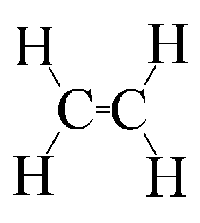WHAT'S NEW ABOUT THE ROLE OF ETHYLENE IN PLANTS?
By Wendy Beyer, '98, Kenyon College


 Ethylene plays a major role in many aspects of plant growth and development. Among its effects are:
Ethylene plays a major role in many aspects of plant growth and development. Among its effects are:
- Promoting fruit ripening by causing changes in membrane permeability which result in metabolic changes
- Seedlings have a characteristic triple response phenotype to ethylene including inhibited stem elongation, increased stem thickening and increased lateral growth
- Contributes to apical dominance
- Protects shoot tip by causing hook formation during emergence of dicot seedlings
- Interacts with auxin, acting as a second messenger in root gravitropism and elongation
- Involved in regulating abscission: normally a gradient of auxin maintains the abscission zone, however if this gradient is disturbed the plant becomes sensitive to ethylene (even at very low concentrations), causing rapid production and secretion of hydrolytic enzymes resulting in abscission
- Involved in initiating the expression of stress responses in plants
- Ethylene also influences cell expansion by initiating a change in the orientation of cellulose microfibrils being laid down in the cell wall, thus influencing the axis of growth
(Moore, 1989)

 Ethylene biosynthesis within the cell has been well characterized.
Ethylene biosynthesis within the cell has been well characterized.
To view a diagram of ethylene biosynthesis click here 

There is lots of interesting research involving the role of ethylene in plant growth and development going on even as we speak . . .
Click on the following to hear about some of the recent findings:
 New Info About the Ethylene Signal Transduction Pathway
New Info About the Ethylene Signal Transduction Pathway
 Ethylene Action: At The DNA Level
Ethylene Action: At The DNA Level

 Go To Bio45 Homepage
Go To Bio45 Homepage
 Go To Kenyon College Homepage
Go To Kenyon College Homepage



 Ethylene plays a major role in many aspects of plant growth and development. Among its effects are:
Ethylene plays a major role in many aspects of plant growth and development. Among its effects are:
 Ethylene biosynthesis within the cell has been well characterized.
Ethylene biosynthesis within the cell has been well characterized. 

 New Info About the Ethylene Signal Transduction Pathway
New Info About the Ethylene Signal Transduction Pathway Ethylene Action: At The DNA Level
Ethylene Action: At The DNA Level
 Go To Bio45 Homepage
Go To Bio45 Homepage Go To Kenyon College Homepage
Go To Kenyon College Homepage